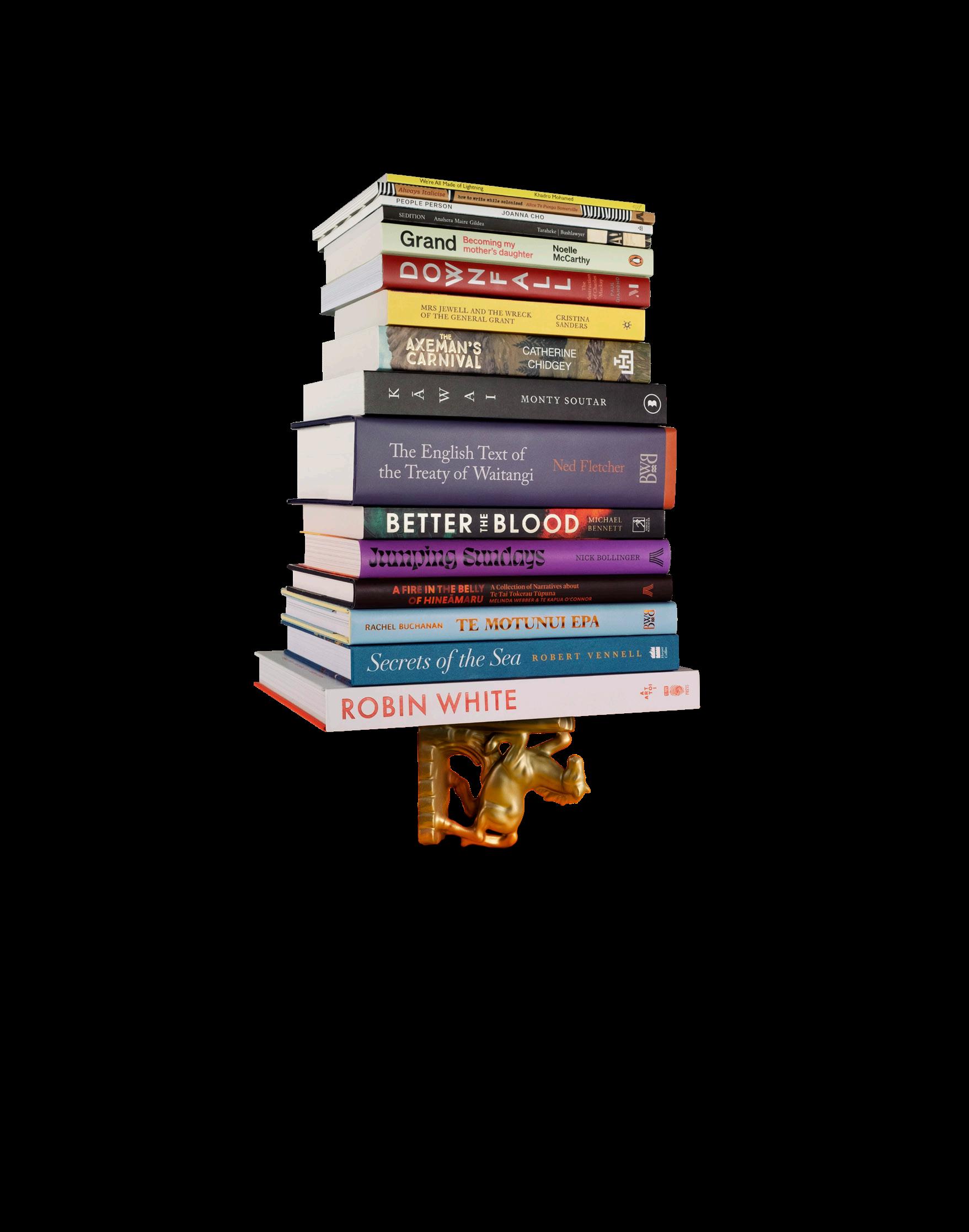Ockhams Sampler
Extracts from the finalist books in the Jann Medlicott Acorn Prize for Fiction at the 2023 Ockham New Zealand Book Awards

Extracts from the finalist books in the Jann Medlicott Acorn Prize for Fiction at the 2023 Ockham New Zealand Book Awards
The Jann Medlicott Acorn Prize for Fiction at the Ockham New Zealand Book Awards is the country’s richest literary prize, with $64,000 going to the winner in 2023. It recognises both novels and short story collections by a single author.
This year’s fiction judging panel says the finalists in this category vividly demonstrate the excellent quality of a wide variety of work produced in the last year. “Two stellar historical novels rival for their portrayal of lost worlds, one set in eighteenth-century Aotearoa, the other on a nineteenthcentury sub-Antarctic island. And in the other two shortlisted books, contemporary New Zealand, urban and rural, is vividly and memorably evoked in tightly written crime and through the eyes of a wild but insightful bird.”
The 2023 fiction judges are bestselling author, critic and creative writing teacher Stephanie Johnson (convenor); editor and literature assessor
John Huria (Ngāi Tahu, Muaūpoko, Ngāti Apa ki te Rā Tō, Ngāti Rangi); and Rotorua bookseller Jemma Morrison. They are joined in deciding the ultimate winner from their shortlist of four by British writer, publisher and host of the books podcast Backlisted, John Mitchinson.
This Ockhams Sampler gives you a taste of the craft at play in each of this year’s shortlisted novels. You can read the judges’ comments about each finalist in orange at the start of that title’s extract.
Look out for samplers of the finalists in the other three categories in the Ockham New Zealand Book Awards. As they are rolled out in the coming weeks, you will find them here:
www.issuu.com/nzbookawards
www.anzliterature.com
https://www.nzbookawards.nz/new-zealand-book-awards/resources/
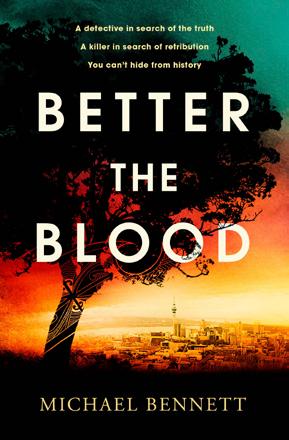
Michael Bennett
Published by Simon & Schuster
KĀWAI: FOR SUCH A TIME AS THIS

Monty Soutar
Published by Bateman Books
MRS JEWELL AND THE WRECK OF THE GENERAL GRANT
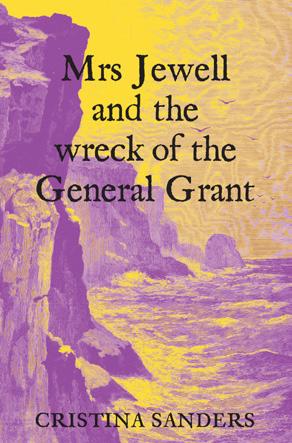
Cristina Sanders
Published by The Cuba Press
THE AXEMAN’S CARNIVAL
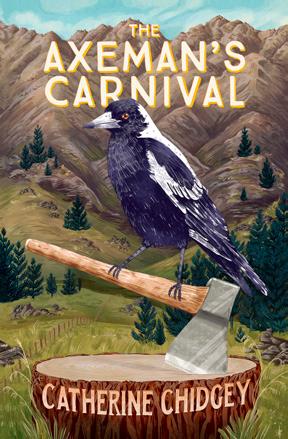
Catherine Chidgey
Published by Te Herenga Waka University Press
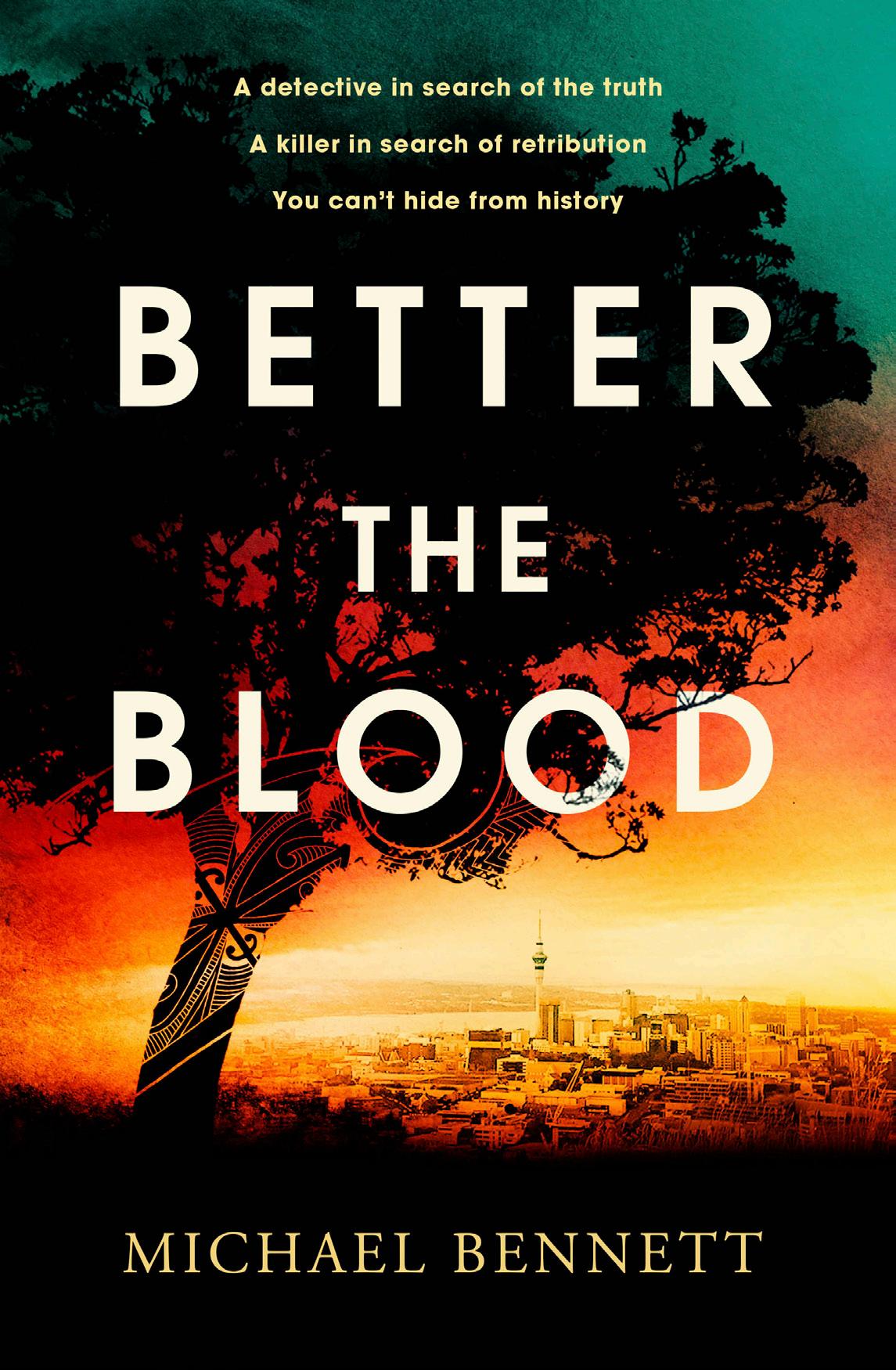
Michael Bennett’s finely tuned thriller opens with an historical atrocity before moving to a contemporary series of murders. Detective Hana Westerman is caught between being a good cop or a kupapa collaborator, and the cases become frighteningly personal. Excellently paced and populated by complex characters, this intricate novel centres on conflict between utu and on the aroha, hūmarie and manaaki needed to move forward.
5 October 1863.
His hands move quickly as he polishes the sheet of silver-plated copper to a perfect mirror finish. He is well practised at this. On a good day, say on a day where he has been engaged to create portraits of a number of members of a wealthy London merchant family, he could easily craft thirty daguerreotypes, perhaps more. In this godforsaken place on the other side of the world, though, it is far more difficult. Engaged by the Queen’s army to make permanent records of the colonial campaign, he finds himself again and again practising his art in the field where he has no permanent studio, no
light-safe room where he can prepare the materials.
It is a challenge. To say the least. But he prides himself on his professionalism.
Under cover of a black cloth, the daguerreotypist places the highly polished plate in a sensitizing box containing iodine crystals. He waits patiently for the fumes to react with the silver. Others there are not so patient.
‘We haven’t got all day for this,’ says the captain of the troop. ‘Hurry up, man.’
The captain is quite drunk and has been so for hours, ever since his men successfully apprehended the captive. If truth be told, he is inebriated far more often than he is sober, a fact his men know well, attested to by the ongoing lack of rum in their evening rations, and while none would dare make a complaint about the situation, the captain’s appetite for the bottle has made him no friends amongst his subordinates.
Under the black cloth, the daguerreotypist quietly counts the seconds for the chemical reaction to take hold sufficiently. Twentyfive elderflower, twenty-six elderflower . . .
‘What are you up to under that damn sheet?’ the captain demands, impatient to get back to his tent. His bottle is only half finished and there’s little left of the day.
In the darkness under the sheet, the daguerreotypist sighs. Thirty-five elderflower, thirty-six elderflower . . . For a while, he entertained grander plans for his life. He once had dreams of studying at the Royal Academy Schools, imagining a life as a painter who might reinvigorate and modernize the Flemish style for an adoring British art world. But as the son of a long line of blacksmiths, there was scant hope of either being accepted into the Academy Schools, or being able to afford the extraordinary tuition fees. Faced with the horror of carrying on the family trade of horseshoes and iron gates, he settled instead on this new art form,
the imprinting of the light spectrum onto silver plates. Preserving frozen images of life not in oil or watercolour but in copper and mercury and silver. A way for him to make a shilling while using his considerable skills in the play of light on the landscape or on the human form.
It’s not painting. But it will do. Forty-five elderflower. He emerges from the black cloth. ‘About fucking time,’ says the captain.
The daguerreotypist goes amongst the soldiers, carefully moving and repositioning each of them to most advantageously address the stark New Zealand light as it falls through the branches of the towering tree they stand beneath. ‘This is modern-day alchemy,’ he enthuses, aware that for those unfamiliar with this new technology, the process of creating a daguerreotype can be disarming. ‘A little piece of magic. Your images are captured for all time; this moment will remain long after your bones are dust.’
‘Get a move on,’ slurs the captain. ‘I need a shit.’
‘Rum does that to a man’s bowels,’ one of the soldiers says, being sure it is not loud enough for the captain to hear.
The daguerreotypist returns to his box apparatus, irritated by the captain’s drunken disregard for his art. ‘This is called the lens,’ he explains, indicating the small protrusion that emerges from the middle of the wooden box. ‘When I remove the cap, you must stay perfectly still. Perfectly still. The slightest movement and you will be but a smudge on the page of history.’
Apart from the captain’s rum breath and flushed face, the soldiers have approached this process with gravity, polishing their uniform buttons, cleaning their tall dress boots to a shine.
‘How are we meant to look?’ one of them asks. ‘Do we smile?’
‘Was Christ smiling in The Last Supper?’ snaps the daguerreotypist.
‘He was about to have bloody great nails hammered through his
hands,’ the youngest soldier points out. ‘No wonder he wasn’t bloody smiling.’
Ignoring the laughter, the daguerreotypist perseveres. ‘Did Michelangelo carve a fool’s grin onto David’s face? Smiling makes a man an idiot,’ he insists. ‘Smiling is for simpletons. Don’t smile.’
He positions himself by the lens.
‘Ready,’ he warns. ‘Quite still, please. And . . . hold.’ He removes the cap.
Instantly the exposed image ricochets between a series of mirrors within the body of the wooden box, the light finally falling upside down against the polished silver plate. The photochemical reaction begins to capture the moment.
The six members of the troop, the inebriated captain and his five men, are gathered under a towering pūriri tree on the crest of a volcanic cone overlooking Auckland harbour. As the reaction develops, it is plain that, despite not attending the Royal Academy Schools, the daguerreotypist has an instinctive grasp of the rule of thirds. The image has a sense of proportion that is almost classical.
Below the tree, the six soldiers face the lens in an aesthetically pleasing curving semicircle. Suspended above them, a few yards over their heads, secured to one of the lower branches of the great tree by a length of twelve-strand British Army rope noosed tight around his throat, a seventh person forms the apex of this carefully considered composition.
The dead man is naked, the captive stripped and humiliated before he was executed, retribution for having evaded the pursuing troop for a quite embarrassingly long period. As well as the rope around his neck, his hands are tied in front of his torso, his feet bound at the ankle. The man is Māori, and the tā moko* tattooed on
* Tā moko – traditional form of Māori tattooing, signifying status or social standing
his face and body show the markings of a high-born leader. He is silver-haired, in his fifties, and the swirls and lines gouged deep into his skin tell a tale of his lineage, his status, the knowledge he carries, the whakapapa† passed down to him across generations.
A rangatira, a chief of great stature.
‘How much longer?’ the captain slurs.
‘Do not speak,’ the daguerreotypist barks. ‘You will be a smudge on the page of history!’
After the necessary sixty seconds, the cap goes back on the lens.
† Whakapapa — genealogy, line of descent
Published by Bateman Books

In senior Māori historian Monty Soutar’s powerful novel we learn histories that transport us across place, time, and generations. We become wrapped in the passion and honour of a mid-18th century ao Māori. Tikanga and mātauranga Māori, rangatiratanga, and love for the whenua and the iwi immerse us; butchery, enslavement, and spiritual curses smash. Mana foments the fires of war. Can later generations reassert balance?
‘He tama! He tama!’ A son! A son!
Tāwae let out a shout as news of the birth was delivered to him at Kō Pā. His immediate thought was to give thanks to the gods, so with his two-year-old daughter Manu-pōkai swaddled on his back, he raced up to Kai-namu-namu, the highest point in the pā.
As he ascended the terraced rise he could see four other distant hill pā, all about the same size, their summits cleared of bush, and all within a day’s walk.
Each of these hills was the stronghold of a separate hapū or clan who, when united, brought together a huge swathe of territory and
formed the tribe known as Ngāi Haere. All that Tāwae surveyed in this tranquil, lush environment where his ancestors had lived and died, from the far side of the mountains all the way to the sea, including its bounteous fishing grounds, was under his stewardship, and now there had come news of a healthy son.
Facing the ocean, which was clearly visible from the pā, he lifted his eyes to the rising sun and spoke to the sea:
‘Haramai, e tama!
I haramai nei koe i Tawhiti-nui,
I Tawhiti-roa,
I Tawhiti-pāmamao, I te Hono-i-wairua.’
Welcome, son!
You have ventured forth from great Tawhiti, From distant Tawhiti, From a long way away, From where departed souls meet.
The young chief’s phrases linked his son with their various homelands and the original wayfinders who, fifteen generations earlier, so he had been taught, charted a deliberate course to make landfall on the eastern seaboard of Te Ika-a-Māui, the last-discovered great landmass of the Pacific Ocean. These hardy and adventurous risk-takers survived a 20,000-nautical-mile voyage in double-hulled craft, and Tāwae implored the gods to infuse his son with these same qualities.
He had been told both mother and baby were well so the chief readied himself to visit. Above average height, slim but muscular, Tāwae was nineteen years old. About his waist he wore a flax kilt, a spatulate or greenstone mere tucked into his belt, and his brow, cheeks and lightly bearded-jaw were incised with moko — emblems of his superior rank. His kāwai or lineage was, without question, the most coveted in the district.
Of late, whenever the mountain Hikurangi was capped with snow, his people had started remarking, ‘Ka rukuruku a Te Rangi-tāwaea i ōna pueru.’ Tāwae is gathering up his garments. Rangi signified the sky and was a title given to chiefs. Tāwae had accepted the title when his elders made him chief in place of his deceased father. Often his people addressed him ‘e Rangi’ instead of ‘e hoa’ or ‘e hika’ — the terms for ordinary people. Tāwae knew of no one else whose mana or status had been likened to the mountain, and he was almost embarrassed whenever he heard the reference.
I have everything to be thankful for, he told himself, and for a moment his chest swelled with pride. But any sense of satisfaction he felt was always quickly replaced by a more familiar feeling: bitterness.
The dawn was looking set to blossom into yet another perfect summer’s day as Tāwae made the steep descent from the pā. He breathed in the rich fragrance of the sweet-scented trees, ferns and other plants that flanked the path, while giving his daughter a beaming smile over his shoulder.
‘You are about to see your new baby brother, little Manu.’ She returned her father’s smile with a dimpled grin of her own. She was the apple of her father’s eye.
Tāwae walked swiftly as he reached the bottom of the pā hill and approached his village. At the stream he caught a whiff of pungent smoke coming from the site of the whare rauhi. After the warm air dissolved the morning dew, Kiri and her newborn had been moved to a whare kōhanga, where she could recover. The birthing hut, according to custom, was being burnt under the guidance of the tohunga, so that the area would be free of tapu.
A temporary lean-to with a nikau-leaf roof was set up nearby to serve as a cooking area, its palm leaves affording the cooks some shelter from the fierce rays of the sun. Kiri’s meals would be placed at a distance from the kōhanga for her tapuhi to retrieve. The young woman, like Kiri’s mother Arakura, was considered untouchable and
had to stay away from her family and others until after the naming ceremony. Until then, only the couple’s near relatives could visit.
As Tāwae approached the kōhanga, the tohunga suddenly appeared, carrying a wooden bowl. He was a big man, with bushy greying hair and stooped shoulders. Every Ngāi Haere village had at least one tohunga. Some were oracles, several were seers, diviners and necromancers, and others more like medicine-men.
Until their defeat at Te Maniaroa, Whānau-a-Mate had been feared by all in the surrounding country because of this particular tohunga. Other, less powerful, tohunga avoided him. He was strong in magic and potent in war-medicine so that the tribe never went into battle unless sanctioned by him. But these days he no longer claimed to be able to intervene in war matters, nor as a medium to conjure the spirits to appear. After Kiri became pregnant his demeanour became increasingly haggard and sombre.
‘Kei te aha rāua?’ Tāwae enquired. How are they?
The tohunga grunted, ‘Kua pai.’ Fine He looked around as if he half expected someone else to be there.
‘Have you completed the ritual?’ Tāwae asked.
‘Uh-huh,’ the tohunga nodded. He now seemed very agitated and would not meet Tāwae’s eyes. ‘Kei a au nei te whenua.’ I have the placenta The old man seemed eager to continue on his way so Tāwae waved him up the hill.
‘Whe-nu-a,’ Tāwae rolled the word on his tongue as he reached the porch of the kōhanga. It not only meant placenta; it was also the word for land. The burial of the whenua was vital for it would forever connect his son to Ngāpō.
He crouched down at the entrance, his heart beating faster than a fisherman with several tāmure on his line. He pushed his daughter through the small opening into the warmth of the kōhanga, then crawled in after her. Intricately patterned mats were lying on fresh fern leaves to make it comfortable for the three women.
Kiri appeared as if in a trance, gazing at the bundle swaddled in her
armpit, then nuzzling into him as if she was going to gobble him up. Manu-pōkai scurried over to her baby brother and gently patted his black patch of hair. The little girl’s face glowed.
‘Nohi-nohi,’ the toddler said quietly. Little one. She looked up at her mother.
The chief gazed admiringly at his wife. The dark circles under her eyes were the only hint of what she had been through. She had such a perfect face. When Kiri glanced up at her husband he was reminded of the ocean — refreshing, exciting, humbling, mysterious, sometimes terrifying, but always beautiful. Not for the first time the young chief was struck by how lucky he was to call this beauty his wife. Tāwae gently touched his palm against Kiri’s upper arm and turned her to him, pressing his nose against hers for several long moments in an intimate salute. ‘Taku kare-ā-roto,’ he whispered. My soulmate.
Tāwae did not even look at his baby son until he was satisfied that his wife was in good health. The first thing he noticed when he did finally look down were tiny toes peeking from the frayed ends of the shawl. Tears of relief and joy flowed down his cheeks.
‘This is the answer to our prayers,’ he said in a wavering voice. Taking up the bundle, the chief inhaled the newborn’s sweetness, a kind of intoxicating purity. He then studied their son for several minutes. He was dark brown, nearly black, ample-chested and, like his mother, long of limb. Tāwae could not have been happier and his huge grin said it all.
‘He often kicked in my womb, you know,’ Kiri remarked.
‘That augurs well for us,’ Tāwae replied.
‘Remember the tohunga’s prophecy?’ Kiri asked. Tāwae’s expression turned momentarily thunderous as his eyes went from their son to his wife.
‘I could not forget if I tried.’ He clenched his jaw as the reality of his father’s murder hit him like a dagger.
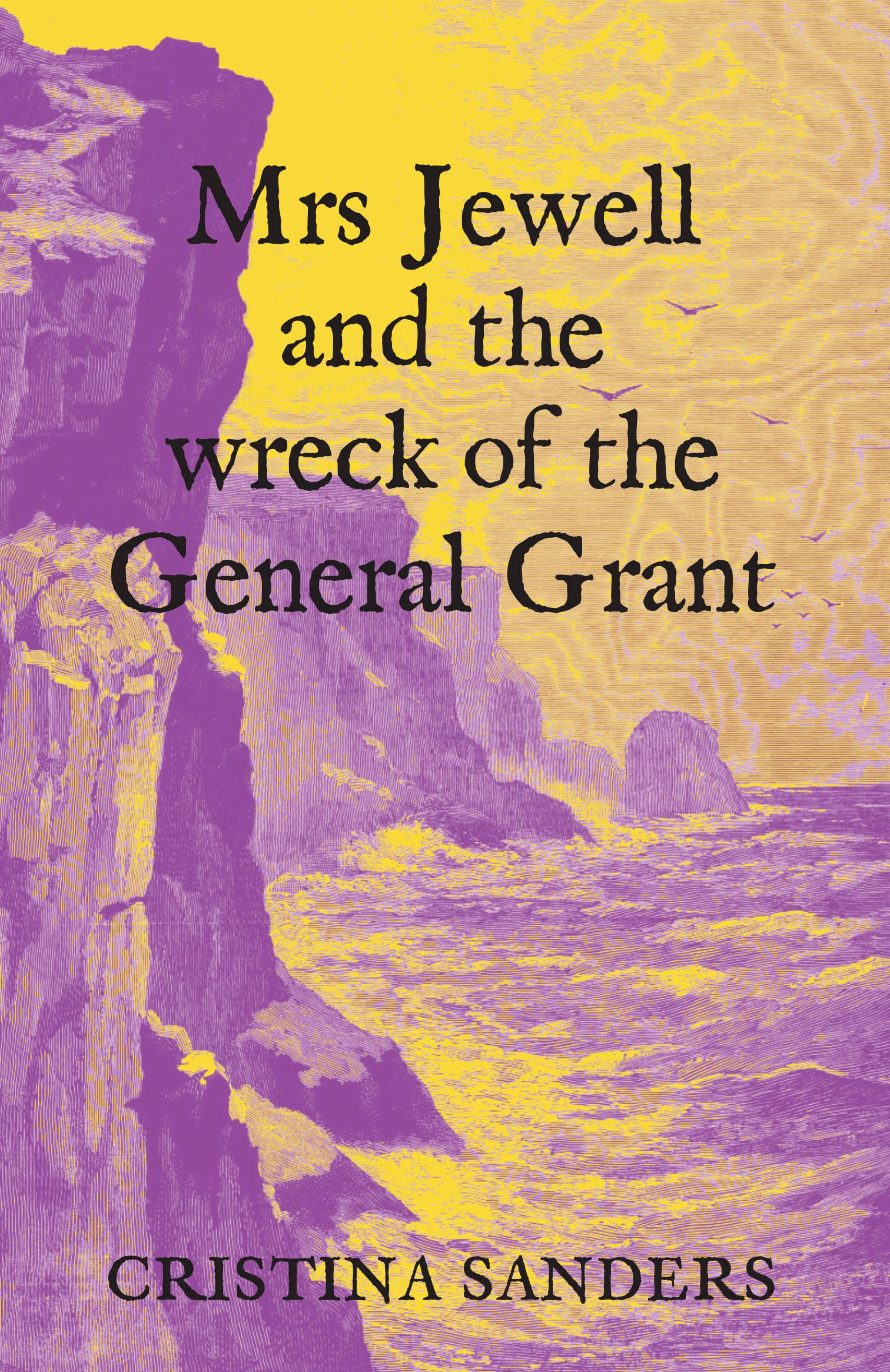
Based on the true story of an 1866 shipwreck, this re-telling of the endurance of the survivors on a sub-Antarctic island is impeccably researched and peopled by rounded, realistic and complex characters. Dramatic and well paced, it is rich with vivid descriptions of sea, land and weather, and Cristina Sanders offers insight into the physical and psychological effects of being stranded in an inhospitable environment. Historical fiction at its best.
Ipeeled myself from the wet sand and sat up with my arms wrapped around my knees. My eyes were thick with salt and I blinked through a haze of tiny flies that circled my face. My fingers ran across cuts dragged down my face, washed clean in seawater, numb. In the pale light, shapes formed into people. They moved and I lost them.
I felt hard and empty as a shell.
I concentrated. Willed breath into my body. Willed my heart to beat. Put my mind to my extremities and raised a finger, tapped a foot. Slowly I turned my head.
I counted fourteen men on the beach. Sailors. Miners.
Some were barefoot and some without shirt or jacket, as if they had been surprised by the disaster, pulled from sleep without time to dress properly, white-chested as gulls.
I didn’t know what kind of men they might be. Violent or mad. Ungodly, evil. How could I tell? They had stopped moving now and dropped their hands onto their knees, heads slumped. It looked like relief. As if they had reached the end of their troubles, as if they had arrived somewhere. But there was nothing. In this bleak place I knew our troubles were just beginning. We hadn’t arrived anywhere. We were castaways.
Mr Brown, our only officer, stood at the edge of the harbour, disengaged from the others. He watched a wide-winged albatross sweep across the grey sky. His hands hung at his side, empty. He was a big man, but he was made small by the sea.
I swayed with sickness, more than the feeling of being on land after so long rolling. I felt the blood had washed from my body and been replaced by seawater that was freezing my flesh from the inside.
A sailor brought fresh water in a tin to me and I cut my lip on the jagged edge as I gulped it down, so cold it pinched the back of my nose. I hadn’t recognised how thirsty I was, how my body had filled up with salt. The little biting things flew in a black cloud around my head.
The sailor’s bare feet disappeared and were replaced by Joseph’s boots. I was glad he had kept his boots. “Teer has matches,” he said. “We’re going to light a fire.”
“We have nothing to cook.”
“We’ll get warm for a start.”
“The men will want to eat.”
“We have a few tins of meat still. And a piece of pork.” He crouched beside me, laid his hand on my shoulder. I didn’t have the words for
the menace that gripped me, the fear of being so exposed. I couldn’t make sense of what had happened to us and was frightened of what would happen next. We had nothing but a few morsels and the men were starving.
“And when that’s gone? What will they eat tomorrow?” I asked. I looked along the desolate beach and saw stones, grass, trees. Nothing a man could eat. There was no settlement here, no human comfort. God help me, but I was in a dark place. “When they are dying of hunger, will they turn on me?”
Joseph looked shocked. “No one will harm you, Mary!”
The battered men were regrouping, circling, desperation written in their folded bodies. When they were dying, who knew what they would be capable of? Perhaps each one would sooner eat a woman than starve.
Joseph took my frozen hands in both of his, cupping them as if to share a prayer. “I am with you,” he said. “These are good men. God will protect us.”
But it had been Joseph who had sent me into the sea. And it had been these men, every one of them, who had rowed away from drowning children.
God protect us? I could find no sense of God’s purpose in what had happened. He might do anything. If God … I wanted to say, but I bit my tongue. There was no end to thoughts that began If God …
Three days ago, God had drowned his own minister.
We limped across the beach and joined the men who gathered on a spongy lick of turf above the gravelly sand. They dragged driftwood and grass into a pile. Teer pushed it into some sort of order, scrappy bits of bark and twigs on the bottom, a few small branches above, heavier clubs of wood to the side. The sandflies were everywhere and I was too tired to slap them away. They feasted on my skin.
A scuffle broke out, a tall man in good boots pulling at Mr Brown’s
arm, spinning him around. “The matches!” he shouted. “For God’s sake, man! Don’t waste them!”
Teer turned with his fists up. I saw Mr Brown throw something onto the ground. Surely not a wasted match. Surely he hadn’t spent them all!
“Do we have plenty?” I asked Joseph, but the answer came swiftly on Teer’s heavy punch. Mr Brown, caught on the chin, fell to the ground.
“Oh the foolish, foolish man!” I cried. Seeing the stacked wood now my body was ravenous for a flame, heat to melt me and warm my frozen womb. The stupid man had been striking uselessly at the wet wood and a dozen sticks now lay dead at his feet. I wanted to kick Mr Brown as he lay on the ground.
Teer raged. “Where are the rest? Who has my matches?”
Cautiously he struck the few that remained and only once did the grass catch for a second with a sharp flare before dying. Each lost flame took a little bit of me with it.
There was one match remaining. Teer blew on it, and I thought he said a prayer. But he didn’t strike it. He stood and put it into his hair where no one could reach it.
“We wait until it is dry,” he said.
Teer took the match from his hair. The last match. Our last hope. He struck it with a steady hand. The flame leapt, a delicate orange orb. It shifted to a patch of moss and hesitated, feeling its way around a twig, hissing over a leaf, not alive nor dead. We waited for the intake of breath. A gasp of air from below and the orange burned darker. It ran along a stripe of dry grass. I stood up in the circle of men and we willed the wood to catch, each of us praying, making promises to God of faithfulness and obedience if only the sticks
would catch, if only we could have this fire, this most basic comfort. The light gathered in the dark beneath the tinder, spreading in the loose twigs. With a burst the insides caught and a flame shot up into the stack, through the loosely braided branches and into the air.
It was like a birth, another living thing amongst us. Without it I’m sure I would have died that night. The men fed and fed the pyre, and it grew into a monstrous wall of heat and light and I sat in my steaming clothes, sucking the flesh from the legs of crabs, chewing something that had recently grown on a rock, suffering the scalding heat gratefully. A tin of water was heated and passed around and the warmth filled my belly.
After the few scraps of beach-scavenged food were gone we sat in our own silences, not ready, yet, for talk. We needed something before we could go on, a blessing or an acknowledgement of where we were and what had happened. We had no man of God with us, no doctor or gentleman.
We waited for something to bind us together before we disappeared into the darkness.
“Does any man amongst us have a pipe?” Joseph asked and the men tapped their pockets as they might do in a drawing room at home to discover that no, they must have mislaid their pipe somewhere on the way to this place. But Joseph emptied his pouch onto a flat stone and each man took a pinch of the sodden tobacco, rubbed it between his fingers and sprinkled it into the fire, prayers to bless us tumbling out as the leaves burned. I fell asleep lying against Joseph with his arm around me and the last smell of civilisation drifting away into the sky.
Published by Te Herenga Waka University Press
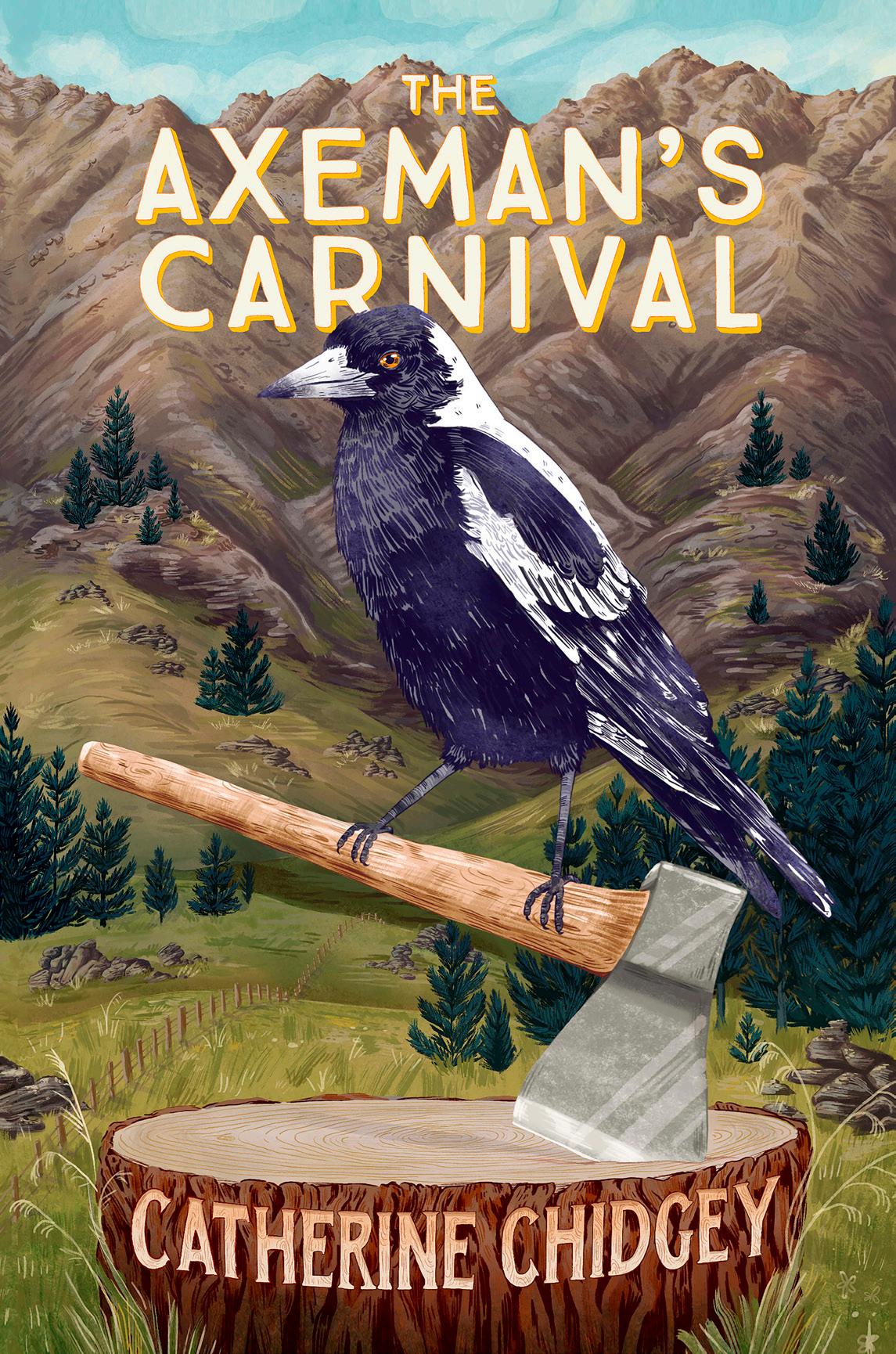
Catherine Chidgey’s novel is a rich mix of humour and tragedy, suspenseful, insightful and compelling. It’s a contemporary down-on-the-failing-farm tale with a highly inventive and entertaining twist: the narrator is a sentient magpie, Tama, who flies from its pages fully formed and loveable. The story unfolds with many laugh-aloud moments coupled with an overriding sense of dread. Chidgey’s writing is masterful, abounding with poetic language and intensely descriptive settings.
People tell bad stories about magpies. That we hold the souls of gossips. That we carry a drop of the devil’s blood in our mouths. That to meet a single magpie brings bad luck, or sorrow, or death. We refused to take shelter in the Ark, people say; instead we sat on its roof and laughed at the drowned world. We were the only bird not to sing at the crucifixion. Magpies bore into cattle and sheep and eat them from the inside out. Magpies steal anything that shines. Witches ride to their seething sabbaths on magpies’ tails. To make a magpie talk, cut its tongue with a crooked sixpence.
When I hid unsure and shaking in the pines that day, I knew none of those stories, but I knew I was not good. I had fled when the person who saved me came under attack. I took cover and left her to my father’s beak and claws. I kept my mouth shut. High on a branch I huddled, thinking he might not find me, that I might disappear into the dappled air. I watched him slash at her, and her face bled and her arms bled, and small and foreshortened she cried Rob Rob Rob, and when at last he let her go he carried a strand of black hair that whipped along behind him, twice his length. He landed at the foot of my tree and stalked around in the dead needles, and his eyes were as red as the dead needles, even redder, and he called of conquest to his audience, and they cackled.
Another magpie with markings like mine – still wearing the mottled grey feathers of a juvenile – sidled along my branch.
‘Are you my brother?’ she asked, and I knew that I was.
She said, ‘Nobody ever comes back. Death by cold. Death by hunger. Death by wire. Death by disease. Death by poison. Death by dog. Death by powerline. Death by car. Death by trap. Death by gun. Death by fall. You fell and you came back. Nobody comes back.’ She looked at me and did not blink.
‘Don’t tell him,’ I whispered.
‘What?’ she said. ‘What what what?’
‘What what what?’ chorused the branches around us.
And he looked up and saw me, and I thought he would pierce my eyes and drink my blood and clean my bones, because hadn’t he said so? But he was no monster, and he called There is my son. My son has come back from the dead. He fell from the nest and he did not die. My son is alive. Come to me. Come come come.
My sister leapt from the branch and skittered down to him, stumbling a little when she landed, then righting herself. I had never flown from such a height – only fallen – but as I followed my sister I felt the air holding me like glass hands. On the ground I too
careened through the needles, and once I came to a stop my father was pecking up the last of the mincemeat. I gaped my mouth and called my begging call, ready for him to feed me, his son back from the dead, and he strode over to me, the meat pink and perfect, and I opened my mouth even wider and called even louder, shrieking My turn my turn, my sister at my back, except she wasn’t begging. She was laughing.
Gulp and it was gone, the last of the meat from home, down my father’s gullet.
‘You’re getting too old to beg, boy,’ he said, and pecked me in my side.
Snagged on the trunk behind him, the strand of Marnie’s hair.
‘Where is my mother?’ I said.
‘Death by car,’ said my sister.
‘And my brothers?’
‘Death by cold.’
‘Quiet now,’ my father told her, and the two of them took a few slow steps onto the grass, scanning it all the while. They stopped and stared, and my sister turned her left ear to the ground, holding her breath, listening for something. Then she plunged in her beak and pulled out a twisting white grub.
And I belonged and did not belong, and I was bird and not-bird. I learned how the wild worked: where to take shelter, and what voice the adults used when another flock tried to invade. I learned to behave. I learned my place. I learned to leap octaves and to sing two notes at once. Certainly, I could talk to my bird family: the sounds came so naturally I barely had to think, and if I tried to form human words they stuck somewhere inside me like sad memories. My sister taught me to land on a branch or a fencepost or even a single wire without losing my footing. I lay with her in a sun-trance, staring at nothing, beak open, head twisted and feathers spread to let the heat
touch my skin. She showed me the shape of the harrier hawk high against the blue, and how to tell berries from poison, how to smash open a snail. How to balance on the back of a sheep, claws hooked in the wool, scanning the ground for cicadas and moths, and how to rub the sting from a wasp so it was safe to eat. I flew for food, spying mice and lizards from the air, but I flew for the joy of it too, for the feel of every feather stroked flat. And I saw that black is not just black, but green-black, purple-black, blue- black. My father took me down to where the cherry trees grew, and explained that the birds who stared with shining eyes from the branches were dummy birds, not real: a trick to scare us. He showed me how to strip the flesh from the cherry stones, but I must never go near the cages, no matter the succulent bait inside, because every cage was a trap. I must never go near the reeking pit on the hill, either – not unless I wanted to see all the things the humans poisoned and shot and killed and threw away to rot. Even their own dogs, he said, if they wouldn’t work.
I could feel him watching me as we flew past the yolk-yellow house, and I did not look at the place, I did not slow the beat of my wings to glimpse Marnie through the windows, nor try to make the sound that was her name. My sister and I played games, fetching a eucalyptus leaf or a poplar leaf and passing it back and forth: You keep it, no I don’t want it, you keep it. We flew up past the pines to where there were no trees, and we hid from each other behind the matagouri bushes and the fluttery tufts of tussock and the rocks that held the heat, picked our way around the patches of speargrass with their knife-edge leaves and their savage flowers. We pulled on each other’s wings and tails, bumped breasts, pretended to fight, and when our father came to scold us we rolled on our backs and showed him our soft bellies. My sister taught me to listen for grubs in the paddocks too, and I waited for a bit of peace and bloody quiet, then tilted my head and tried to follow their swish and gnaw. And yes, there it was, down deep, biting at the roots of the grass,
and I took one slow step and then another until a grub was right underneath me, and then I stabbed for it. And when one of my uncles died – death by powerline – I went to the vigil with everyone else and cawed and keened for him, and nudged at his cold wing.
And yet.
My father kept his eye on me, waiting for me to betray myself. Every day he told me another bad story about humans: they wrung our necks, they ran us down, they shot us, they poisoned us.
‘Doesn’t that bother you?’ he said.
‘Yes, Father,’ I said.
‘I don’t think it bothers you. I don’t think you believe me.’
‘I believe you, Father.’
‘You still reek of her.’
And I did not perch with the other birds high in the pines; I took my place on a scraggy lower branch that offered little shelter. But below the trees, down at the foot of the hill, I could see the yolkyellow house, and hear the scree, scree, scree of the clothesline as it turned in the wind, all the dresses and shirts alive.
Kāwai: For Such a Time
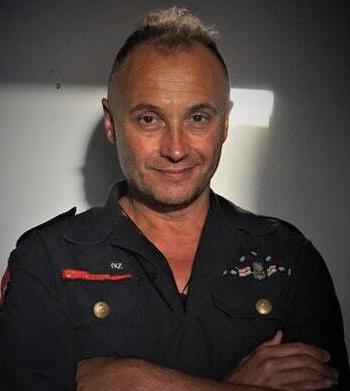
Whakamihi to all the authors whose work has been recognised and honoured in this year’s Ockham New Zealand Book Awards. We urge you to seek out their titles in bookstores and libraries around the motu, and to join us to hear the finalists reading from their books, and to celebrate the ultimate winners, at the awards ceremony on Wednesday 17 May, during the Auckland Writers Festival. To find out more follow NewZealandBookAwards or #theockhams on Facebook and Instagram.



The Ockhams Samplers were compiled with the assistance of the Academy of New Zealand Literature.


Look out for the other category samplers at:
